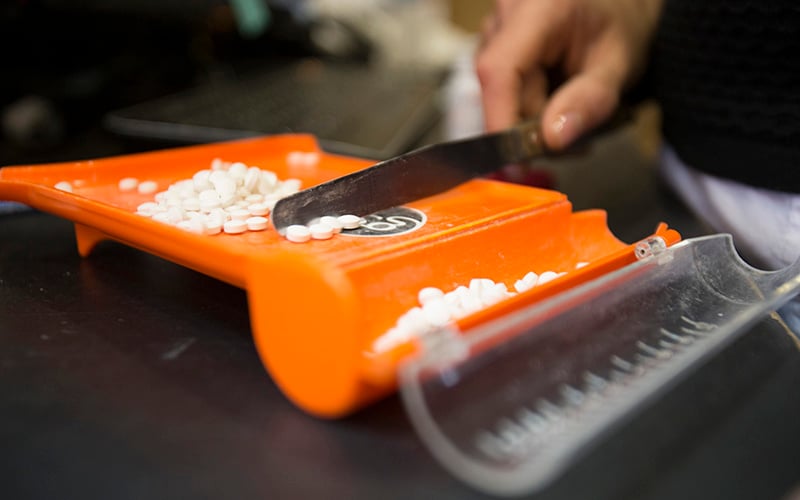
Arizona has recorded more than 3,300 opioid-related deaths in the past two years, according to the Arizona Department of Health Services, part of a national crisis of deaths in recent decades related to prescription painkillers. (Photo by Johanna Huckeba/Cronkite News)
WASHINGTON – Arizona Attorney General Mark Brnovich asked the U.S. Supreme Court Wednesday to stop the Sackler family from “looting” Purdue Pharma of billions of dollars being sought by victims of the opioid crisis the company is accused of helping create.
Taking a case directly to the court is highly unusual, but Brnovich said it is needed so that states like Arizona can “recover the funds needed to repair the damage” from prescription painkillers that have claimed 400,000 lives in the U.S. over the last two decades. Arizona recorded 3,370 such deaths in just the last two years.
The complaint claims the company, which is owned and controlled by the Sackler family, has transferred more than $4 billion to eight family members since 2008, a year after pleading guilty to federal charges that that it misled the public about the addictive properties of its drug, OxyContin.
“It is unconscionable that companies responsible for fueling this crisis might escape paying restitution to victims by transferring billions of dollars made on opioid sales to company owners and then possibly filing for bankruptcy,” Brnovich said in a statement released Wednesday.
But legal experts called it highly unlikely the Supreme Court will agree to take the case, one of thousands against the Sacklers and the company they control. In a statement Wednesday, Purdue charged that Brnovich’s suit is merely a way of “leapfrogging” ahead of other claims.
“The United States Supreme Court is an improper forum to conduct a trial of the claims being made by Arizona,” the company’s statement said. “This petition was filed solely for the purpose of leapfrogging other similar lawsuits, and we expect the Court will see it as such.”
Experts expressed doubt about Brnovich’s strategy. The Supreme Court typically hears appeals of cases that have been heard in other courts, and generally only takes original cases when they involve disputes between states.
Paul Bender, a professor at Arizona State University’s Sandra Day O’Connor College of Law, said the high court is not a trial court and the justices usually want to hear the facts and opinions of lower court to expose the real issues. He said he does not see why the court would make an exception for this case.
“I don’t see anything here that would lead the Supreme Court to make an exception … and take this case immediately,” Bender said. “Almost always, they want the lower court decision before they decide to take the case.”
He said that unless there is a substantial reason for jumping ahead of lower courts, chances the Supreme Court will take Brnovich’s case are near to none.
Former Arizona Attorney General Terry Goddard agrees that it may be a long shot, but that if the court would make an exception for any case, it would be this one because of the irreparable harm being committed.
“If there ever was a case that justified going deep, and potentially having the court take jurisdiction, it is this case,” Goddard said.
“If there is massive damage, as there may well be, in the various lawsuits being brought on across the country, that’s $4 billion that may not be available for people who were harmed by OxyContin,” he said.
The complaint calls the opioid crisis “worst man-made disaster in American history.”
“There have been almost 400,000 opioid-related deaths in the United States in the last two decades,” the state’s complaint said, adding that “prescription opioid misuse costs the U.S. economy at least $78.5 billion annually.”
Purdue admitted in a 2007 settlement with the federal government that it falsely portrayed OxyContin as “abuse-resistant” while urging doctors to prescribe it and flooding the market with the pills. The company paid $600 million in fines and signed a corporate integrity agreement as a result.
That same year, Purdue entered into a consent agreement with Arizona and other states in which the company agreed to stop promoting the drug in deceptive ways.
But Brnovich’s office filed to reopen that case last year in Pima County Superior Court, charging that Purdue had violated the consent agreement.
Purdue now faces “thousands of lawsuits in which plaintiffs, including counties, cities, towns and nearly every state in the country, are seeking to recover billions of dollars under consumer protection and tort law,” the state said in its complaint Wednesday.
Purdue agreed to a $270 million settlement of an Oklahoma suit in March, and news reports say the company has said it is considering declaring bankruptcy as an option to the legal challenges. The Sackler Trust, one of the charitable organizations set up by family members, announced this spring that it would “halt all new giving” in the United Kingdom until the disputes were settled.
Arizona’s claim cites the Uniform Fraudulent Transfer Act, a state law that forbids companies from transferring assets to shield them from creditors.
“The Sackler family, which controls Purdue, has siphoned billions of dollars out of the company in recent years. The law does not permit the Sacklers to reap a windfall while Purdue’s creditors absorb a massive loss,” the complaint said.
It said that 42 other states have nearly identical laws and that the problem is national in scope – both reasons why the Supreme Court should settle the issue now instead of letting it drag out in lower courts.
“The issue is incredibly important to the state,” said the complaint, adding that Purdue and the Sacklers are to blame for devastating communities across Arizona and that “it is critical that Arizona recover the funds needed to repair the damage.”
In an interview Wednesday, Brnovich bristled at the suggestion that the complaint was aimed at getting headlines.
“I think that’s a silly question,” he said. “I’m not going to worry about that.”
-Cronkite News reporter Taniyah Williamson contributed to this report from Phoenix.
